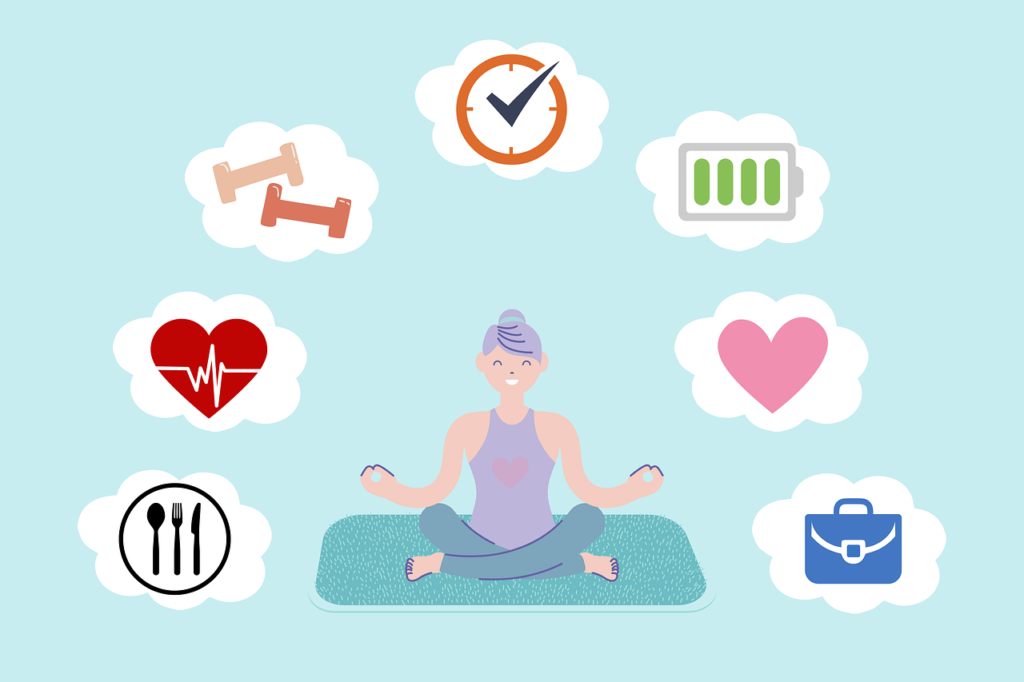In the quest for a healthier and more balanced life, navigating the vast landscape of health and wellness can be overwhelming. With countless trends, tips, and advice available, it’s crucial to focus on practical, evidence-based strategies that promote well-being. This comprehensive guide covers fundamental aspects of modern health and wellness, offering actionable insights to help you enhance your life today.
1. The Power of a Balanced Diet
A well-rounded diet is more than just a trend—it’s the foundation of good health. Consuming a variety of nutrient-dense foods ensures that your body gets the essential vitamins, minerals, and energy it needs to thrive.
Key Principles of a Balanced Diet
- Variety Is Key: Include a wide range of fruits, vegetables, whole grains, proteins, and healthy fats in your diet. Each food group provides unique nutrients that support different bodily functions.
- Portion Control: Eating the right amount of food is just as important as eating healthy. Use portion control to prevent overeating and maintain a healthy weight.
- Limit Added Sugars and Salt: Reducing intake of processed foods high in sugars and sodium can lower your risk of chronic diseases like heart disease and diabetes.
Simple Dietary Changes for Better Health
- Start Your Day with a Nutritious Breakfast: Include whole grains, protein, and fruits or vegetables to kickstart your metabolism and keep you full longer.
- Snack Smartly: Opt for healthy snacks like nuts, fruits, or yogurt instead of processed snacks high in sugars and unhealthy fats.
- Stay Hydrated: Drink plenty of water throughout the day to maintain hydration and support overall health.
2. Exercise: Your Path to Physical and Mental Well-Being
Regular physical activity is crucial for maintaining overall health and well-being. Exercise not only improves physical fitness but also boosts mental health, making it an essential part of a healthy lifestyle.
Benefits of Regular Exercise
- Improved Cardiovascular Health: Aerobic exercises like walking, running, and cycling enhance heart health and improve circulation.
- Enhanced Mental Health: Exercise releases endorphins, which can reduce stress, anxiety, and symptoms of depression.
- Increased Energy Levels: Regular physical activity improves stamina and reduces fatigue.
How to Incorporate Exercise into Your Routine
- Find Activities You Enjoy: Whether it’s dancing, hiking, or swimming, engaging in activities you love makes it easier to stick with your fitness routine.
- Set Realistic Goals: Start with achievable goals and gradually increase the intensity and duration of your workouts.
- Mix It Up: Combine cardio, strength training, and flexibility exercises for a well-rounded fitness program.
3. Mental Health: Nurturing Your Emotional Well-Being
Mental health is a crucial component of overall wellness. Addressing mental and emotional needs is vital for maintaining a balanced and fulfilling life.
Strategies for Maintaining Mental Health
- Practice Mindfulness and Meditation: Incorporating mindfulness or meditation into your daily routine can help manage stress and enhance emotional well-being.
- Seek Professional Help: If you’re struggling with mental health issues, don’t hesitate to reach out to a mental health professional for support and guidance.
- Foster Healthy Relationships: Building and maintaining strong social connections can provide emotional support and reduce feelings of isolation.
Daily Habits to Support Mental Well-Being
- Engage in Relaxation Techniques: Activities like deep breathing, progressive muscle relaxation, or journaling can help reduce stress and improve mental clarity.
- Prioritize Self-Care: Take time for activities that rejuvenate you, whether it’s reading, taking a bath, or spending time in nature.
4. The Importance of Quality Sleep
Sleep is a fundamental aspect of health that impacts nearly every aspect of your life, from cognitive function to physical health. Ensuring you get quality sleep is essential for overall well-being.
Tips for Better Sleep
- Create a Consistent Sleep Schedule: Go to bed and wake up at the same time every day to regulate your internal clock.
- Develop a Relaxing Bedtime Routine: Engage in calming activities before bed, such as reading or taking a warm bath, to signal to your body that it’s time to wind down.
- Optimize Your Sleep Environment: Keep your bedroom dark, quiet, and cool to create a restful sleeping environment.
Recognize and Address Sleep Issues
- Identify and Manage Sleep Disorders: If you have persistent sleep issues such as insomnia or sleep apnea, consult a healthcare professional for appropriate diagnosis and treatment.
- Limit Screen Time Before Bed: Reduce exposure to screens and bright lights in the evening to avoid disrupting your sleep cycle.
5. Stress Management: Techniques for a Calmer Life
Chronic stress can have a significant impact on your health, leading to a range of physical and mental health issues. Effective stress management techniques are essential for maintaining overall well-being.
Effective Stress-Reduction Techniques
- Engage in Physical Activity: Exercise is a powerful stress reliever. Regular physical activity can help lower stress levels and improve mood.
- Practice Relaxation Techniques: Techniques such as deep breathing, meditation, and yoga can help calm the mind and reduce stress.
- Manage Your Time Wisely: Prioritize tasks, set realistic goals, and take regular breaks to prevent feeling overwhelmed.
Building Resilience to Stress
- Develop Healthy Coping Strategies: Find positive ways to cope with stress, such as talking to a friend, pursuing a hobby, or practicing mindfulness.
- Cultivate a Positive Mindset: Focus on the positives in your life and practice gratitude to shift your perspective and reduce stress.
6. Preventive Care: Taking Proactive Steps for Health
Preventive care involves taking steps to prevent health issues before they occur. Regular check-ups and screenings are crucial for catching potential problems early.
Essential Preventive Health Measures
- Schedule Regular Health Check-Ups: Regular visits to your healthcare provider can help monitor your health and detect any potential issues early.
- Stay Up-to-Date with Vaccinations: Ensure you receive recommended vaccines to protect against preventable diseases.
- Adopt Healthy Lifestyle Habits: Avoid smoking, limit alcohol consumption, and maintain a healthy weight to reduce your risk of chronic diseases.
The Role of Health Screenings
- Routine Screenings: Depending on your age and risk factors, schedule screenings for conditions such as high blood pressure, cholesterol levels, and certain cancers.
- Tailor Screenings to Your Needs: Discuss with your healthcare provider which screenings and preventive measures are right for you based on your health history and lifestyle.
7. Building a Supportive Social Network
Strong social connections are essential for emotional well-being and overall health. Positive relationships provide support, reduce stress, and contribute to a sense of belonging.
Tips for Nurturing Relationships
- Communicate Openly and Honestly: Building trust through open communication strengthens relationships and helps resolve conflicts.
- Invest Time in Relationships: Prioritize spending quality time with family and friends to maintain and strengthen your social connections.
- Offer Support: Be there for others in times of need, and seek support when you need it. Healthy relationships are built on mutual care and support.
The Impact of Social Connections on Health
- Emotional Support: Positive relationships can provide emotional support and reduce feelings of loneliness and isolation.
- Health Benefits: Studies have shown that strong social ties can lead to improved health outcomes and increased longevity.





